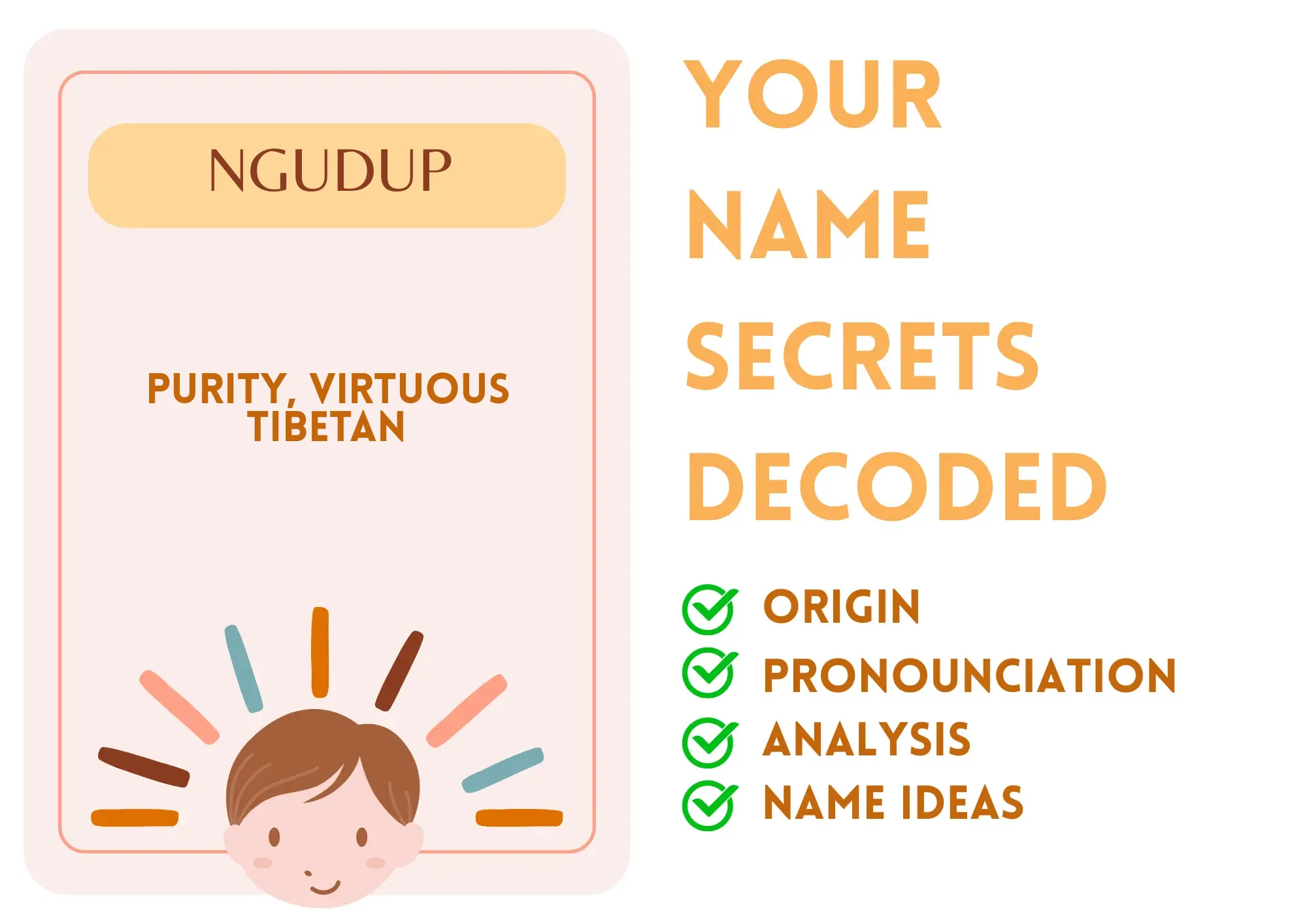
Ngudup
Ngudup is a unique name with indigenous roots, often used among communities in the Himalayan regions, particularly in Tibetan cultures. The name is not as commonly known outside these communities, but it carries significant meaning and cultural weight. Traditionally, Ngudup translates to 'purity' or 'virtuous,' highlighting attributes of integrity and moral character. The name is predominantly masculine, reflecting a strong connection to one's ethnicity and cultural background.
Ngudup encapsulates cultural pride and spiritual significance, linking individuals to their heritage and ancestral traditions. It is relatively easy to write but may pose some challenges in pronunciation for those unfamiliar with the phonetics of indigenous languages.
Though Ngudup may not have a widespread representation in popular culture or literature, it is respected within its cultural context for its significance and the virtues it embodies.
Basic Information
Gender: Boy
Sounds Like: N-goo-doop
Pronunciation Explanation: The name is pronounced with three syllables: 'N' sounds like the letter, 'goo' as in 'goose,' and 'dup' as in 'dump' but with a softer ending.
Summary and Meaning
Meaning: purity, virtuous (Tibetan)
Origin: Ngudup has Tibetan origins, reflecting the linguistic and cultural practices of Himalayan communities.
Usage: Ngudup is traditionally a masculine name, representing strength and virtue within its cultural context.
Name Number (Chaldean)
Name Number (Pythagorean)
Popularity (Global Rank)
Overall: 718509
Boys: 72681
Most Popular in
Religious and Cultural Significance
Religion: Buddhism
Background: In Tibetan Buddhism, the name Ngudup is associated with the moral virtues and purity that are integral to spiritual practice and personal development.
Cultural Significance: The name is respected and revered in its cultural context, symbolizing the moral qualities that are highly valued in Tibetan Buddhist philosophy.
Historical Significance: Ngudup connects to historical Tibetan beliefs, where names often reflect spiritual aspirations and ethical values, embodying the virtues upheld by historical figures within Buddhism.
Popular Culture
Literature and Mythology: While Ngudup does not frequently appear in mainstream literature or mythology, it symbolizes values that are prevalent in Tibetan tales and teachings.
Movies and Television: Ngudup may not have significant representation in popular media but may be used in narrative contexts that emphasize cultural and spiritual themes.
Feelings and Perceptions
Perception: Ngudup is perceived as unique and culturally rich. Those familiar with Tibetan culture view it positively, associating it with virtue and strong moral character.
Positive Feelings: Unique, virtuous, culturally connected, spiritual, respectful.
Negative Feelings: May be misunderstood or mispronounced, especially outside its cultural context.
Practical Considerations
Ease of Writing and Calling: Ngudup is moderately easy to write and pronounce for those accustomed to similar phonetic structures, but its uniqueness may require clarification on pronunciation.
Common Typos and Misspellings: Ngudap,Ngudup,Ngudoo,Gudup
Common Nicknames: Ngu,Doop,Nudy
Ngudup Popularity
Ngudup Usage and Popularity By Country
| Country | Rank (Overall) |
|---|---|
| Nepal | 13473 |
| Thailand | 60600 |
| Canada | 149654 |
| India | 378646 |
| United States | 539518 |
Ngudup Usage and Popularity By City
| City | Rank (Overall) |
|---|
Compatibility Analysis
Famous Persons Named Ngudup
No results found for Ngudup.
Related Names
Similar Sounding Names:
Goodup,Gundup,Nudup